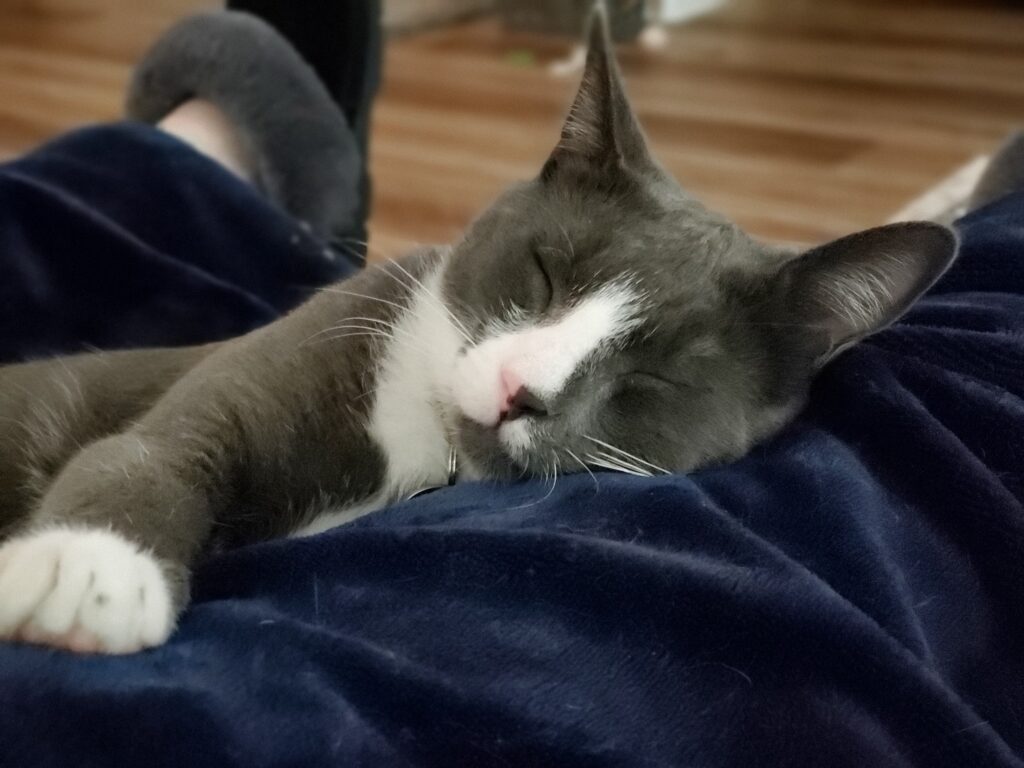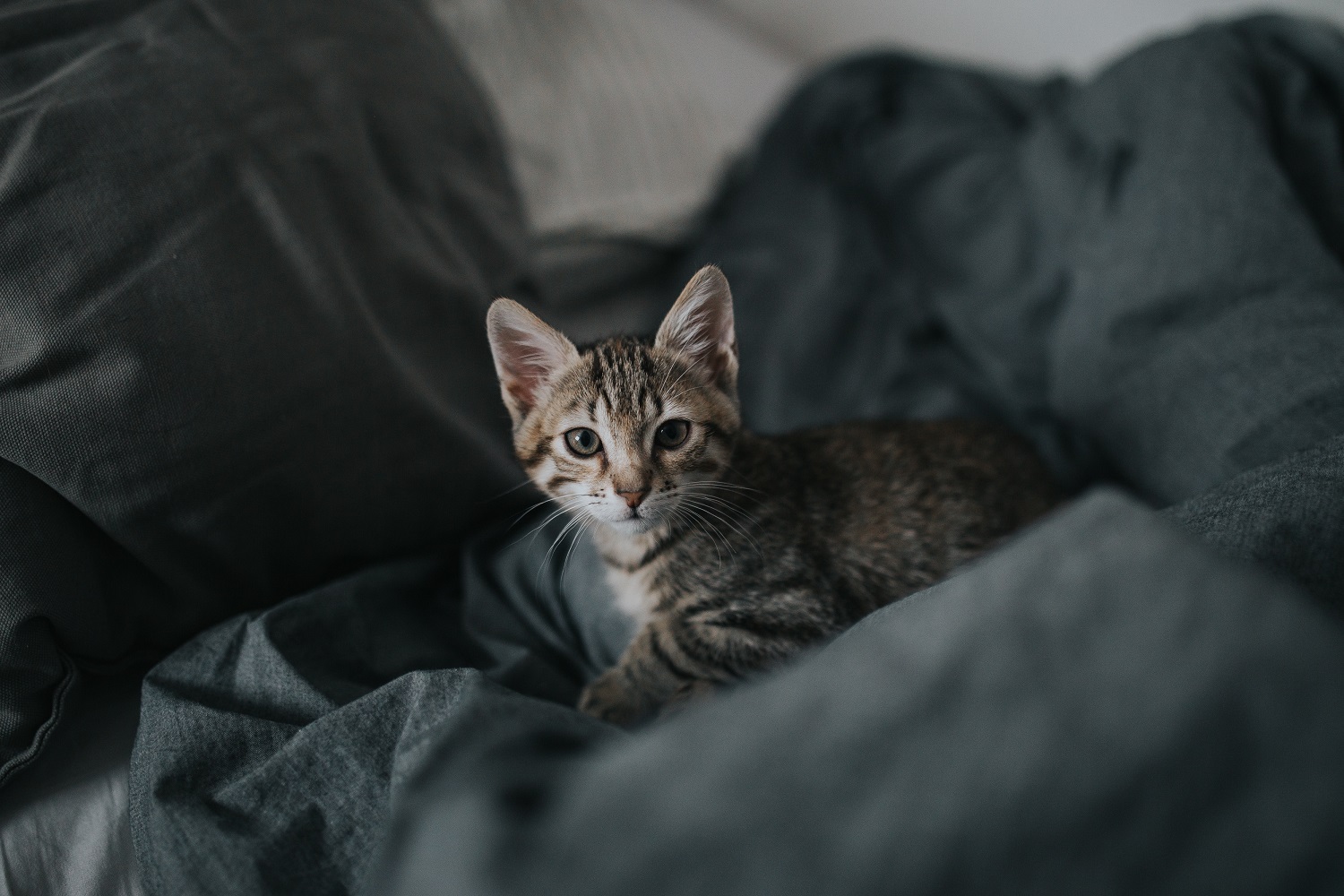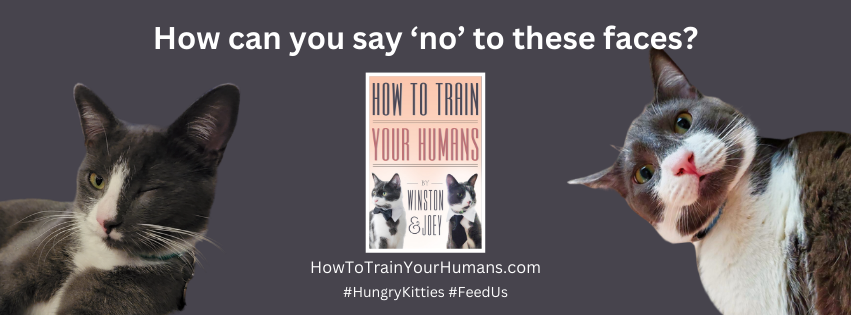You lie down for the night, settle under the covers, and suddenly, there’s a little warm body nestled right between your legs like that spot was custom-made for napping. When your kitten sleeps between your legs, it might feel oddly specific, but to them, it is the perfect place to snooze.
This habit is not random or weird. It is actually one of the clearest signs that your kitten feels comfortable, bonded, and completely safe around you. And while it might limit your ability to roll over at 3 a.m., it is also a sweet little reminder that you are officially their favorite.
Let’s unpack the reasons behind this cuddly behavior and explore what it says about your kitten’s development, comfort, and trust.
Kittens Are Wired for Warmth and Security
Kittens are born with a strong instinct to seek out warmth, comfort, and the safety of soft places. In their early days, that means huddling up with their littermates and mother. As they grow and are introduced to human homes, you become the next best thing.
Sleeping between your legs offers:
- A pocket of consistent warmth
- A soft surface with just the right amount of pressure
- A safe space surrounded by your scent
- A protective position that keeps them feeling secure
Your legs provide all the cozy benefits of a kitten pile without the risk of being stepped on by a sibling. It is the feline version of choosing the best spot on the couch and refusing to move.
It Is All About Trust and Bonding
When your kitten curls up between your legs, they are not just looking for warmth. They are making a statement: You are my person.
Cats are cautious sleepers. They are always a little on alert in case something shifts in their environment. So when a cat chooses to sleep on or near you, especially in a vulnerable position like between your legs, it is a major sign of trust.
This behavior is especially common in kittens who:
- Were well-socialized early in life
- Are forming a strong bond with you
- Are adjusting to a new environment and want reassurance
- Are naturally more affectionate or attached
It is one of the sweetest forms of feline affection. Even if they pretend to be aloof the rest of the day, sleeping between your legs is pure, unfiltered love.
Related read: The Surprising Reason Your Cat Chatters Like a Squirrel.
Why That Spot Feels Perfect to Your Kitten
Your lap might be warm and your chest might be soft, but for some kittens, your legs are the ideal sleep zone. There are a few reasons this very specific real estate is prime napping territory.
1. It is naturally enclosed
When a kitten tucks between your legs, they feel surrounded but not squished. It is a pocket of safety where nothing can sneak up on them.
2. It provides stability
Cats love sleeping in places that do not shift or wobble too much. Your legs offer a stable, elevated surface that supports their whole body, especially if you are lying on your back.
3. It is full of familiar scent
Cats rely on scent to identify safe spaces. Since your legs carry your scent, they signal safety, familiarity, and comfort.
4. It is warm and quiet
Kittens love warmth. The space between your legs holds heat well, and unlike your arms or chest, it moves less during sleep, creating the perfect nap zone.
5. It reduces nighttime anxiety
Sleeping close to you helps ease separation anxiety in young kittens. It provides comfort during nighttime hours, when they might otherwise feel alone or unsettled.
Is It a Problem If They Always Sleep There?
Not at all. In fact, it is a sign your kitten is comfortable and well-adjusted. But if you are someone who needs more freedom to shift at night, it can become a bit of a sleep challenge.
If you need a little more space in bed, you can gently redirect your kitten without hurting their feelings.
Try:
- Placing a soft, warm blanket next to your body
- Offering a heated bed near your pillow or at your feet
- Using a calming scent (like your worn T-shirt) in a cat bed
- Creating a bedtime routine with snuggles before encouraging independent sleep
The key is to keep the experience positive and safe. Don’t push or startle them, and avoid punishing your kitten for doing what comes naturally. Over time, many kittens become more flexible about where they sleep as they grow up.

I suppose those store-bought beds are fine for ordinary kitties, but not for a connoisseur of comfort like myself. It’s like the universe knew I needed a warm, exclusive sleeping location, and, of course, Mom’s the lucky one who gets to provide it. Keep up the good work, human, and I just might continue to grace you with my adorable presence. #KittenRoyalty #Zzzzzzz #AtLeastHumansAreGoodForSomething
Winston
When to Be Concerned
Most of the time, this behavior is totally normal and adorable. But if your kitten suddenly becomes clingy or overly attached to sleeping with you, it could signal discomfort, fear, or illness.
Pay attention if:
- They meow or cry when not allowed to sleep with you
- They become unusually lethargic during the day
- They cling more than usual after a stressful event
- They show signs of pain or physical distress
In these cases, a quick check with your vet can rule out any health concerns. Emotional changes can also happen during transitions like rehoming, weaning, or even after a trip to the vet.
Final Thoughts: Sleeping Between Your Legs Is a Sign of Deep Trust
When your kitten sleeps between your legs, they are not just getting cozy. They are showing you that they feel safe, protected, and totally at home. It is a compliment of the highest order.
So the next time you wake up unable to move because a tiny purring loaf is wedged between your knees, take it as the highest honor. You are their warmest, safest place in the world. Even if your legs are completely numb.
Sources:
Why Cats Like Sleeping on You https://www.petmd.com/cat/behavior/why-does-my-cat-sleep-me
Cat Sleeping Positions and Meaning https://www.icatcare.org/advice/understanding-cat-sleep-behavior
Feline Attachment Behavior https://www.humanesociety.org/resources/how-cats-show-love
Cat Bonding and Social Behavior https://vcahospitals.com/know-your-pet/cat-behavior-social-bonding
Recent Posts
Explore why cats sleep so much, including the evolutionary reasons and the health benefits they derive from their extensive sleep patterns.
Explore the causes of cat dandruff, its implications, and effective ways to deal with it so your feline friend remains happy and healthy.


